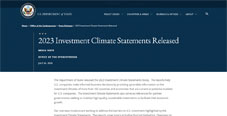
Georgia's Compliance with International Sanctions on Russia and Judiciary Concerns: US State Department's 2023 Report
By Liza Mchedlidze
Friday, July 28, 2023
The US State Department's published report titled '2023 Investment Climate Statements: Georgia' expressed concerns about the lack of independence in Georgia's judiciary and political interference in the judicial system, especially in high-profile cases. The report also highlighted worries about the integrity of the judicial appointment process and the court's ability to deliver quality outcomes, which have a negative impact on investor confidence in the country's court system.
Furthermore, the report mentioned the government's hesitance to conduct a full assessment of the judicial system to ensure compliance with recommendations from the Venice Commission, which further undermines faith in the independence of the judiciary. Despite the efforts by the Georgian government to strengthen the judiciary under its Georgia 2020 strategy, the report pointed out that the existing framework for adjudication of civil disputes in Georgian courts continues to face significant problems, particularly in terms of the independence, accountability, and capacity of the High Council of Justice and the judiciary.
Investors' perceptions of Georgia's court processes as slow, inefficient, lacking transparency, and hindered by a lack of technical expertise were also highlighted in the report. These issues were noted to significantly impact public trust in the judicial system and were among the most pressing concerns for investors when assessing the investment climate in Georgia, according to the report.
"The lack of independence of Georgia's judiciary and political inference in the judicial system, especially in high-profile cases, is troubling. Concerns regarding the integrity of the judicial appointment process and the capacity of the courts to deliver quality outcomes continue to affect investor confidence in the court system. The Government's hesitance to conduct a full assessment of the judicial system to ensure full compliance with Venice Commission recommendations further undermines faith in the independence of the judiciary. OECD's 2020 IPR notes the Georgian government's efforts to strengthen the judiciary to improve the country's business and investment environment under its Georgia 2020 strategy. However, the report highlights that "the existing framework for adjudication of civil disputes in Georgian courts nonetheless continues to suffer from several significant problems despite the reforms. Foremost of these are persisting concerns with the independence, accountability, and capacity of the High Council of Justice and the judiciary. Many investors perceive Georgia's court processes as slow, inefficient, lacking in transparency, and hampered by a lack of technical expertise. All these issues affect public trust in the judicial system. They are among the most pressing concerns for investors in their assessments of the investment climate in Georgia," the report reads.
According to the US State Department's report, Georgia allows foreigners to establish bank accounts without restrictions. Several local banks in Georgia are subsidiaries of international banking groups and are subject to the same regulations. The report states that the National Bank of Georgia (NBG) and Georgian financial institutions fully comply with the financial sanctions imposed by the United States and other countries on Russia. Compliance with international financial sanctions is regularly assessed during onsite inspections of financial institutions.
In 2020, the Council of Europe Committee of Experts on the Evaluation of Anti-Money Laundering Measures and the Financing of Terrorism (MoneyVal) approved the Fifth Round Evaluation Report of Georgia. The report evaluated the NBG's supervisory process and practices and found them to have effective outcomes. It also noted that financial institutions in Georgia generally demonstrate a good understanding of risks and are part of large banking or financial groups that have implemented sophisticated internal systems and controls to effectively mitigate money laundering and terrorism financing risks.
Overall, the report suggests that Georgia's financial institutions are in compliance with international standards and regulations related to financial sanctions, anti-money laundering, and countering the financing of terrorism.
"Georgia does not restrict foreigners from establishing a bank account in Georgia. Several local banks are subsidiaries of international banking groups and are subject to the same regulations.
The NBG and Georgian financial institutions act fully in accordance with the financial sanctions imposed by the United States and others on the Russian Federation. Compliance with international financial sanctions is systematically checked during the onsite inspections of financial institutions.
In 2020, the Council of Europe Committee of Experts on the Evaluation of Anti-Money Laundering Measures and the Financing of Terrorism (MoneyVal) approved the Fifth Round Evaluation Report of Georgia. The report assessed the NBG's supervisory process and practices as having effective outcomes. The report also notes that financial institutions generally have a good understanding of risks and are part of large banking or other financial groups that have put in place sophisticated internal systems and controls which effectively mitigate money laundering and terrorism financing risks." the US Department's report reads.

